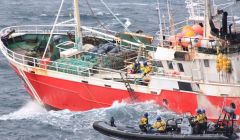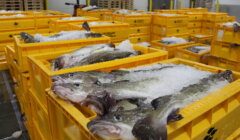News / Marine Scotland defends its boarding policy
Agency says it is operating in a ‘fair, balanced and even-handed way’
MARINE Scotland has “categorically” rejected claims that local fishing boats are being harassed by the marine protection agency while vessels belonging to other EU states are not being inspected as regularly as Scottish boats.
Responding to Shetland News following an open letter by North Isles councillor Duncan Simpson in which he questioned why it appeared that UK vessels were boarded “disproportionally” more often, Marine Scotland said that boarding statistics provided by the agency itself in response to a Freedom of Information request by the councillor did not give “an accurate, overall picture”.
The data provided by Marine Scotland showed that 85 per cent of all ‘at sea’ and 79 per cent ‘in port’ checks were carried out on UK vessels between January and mid-November 2018. The total number of ‘at-sea’ boarding was 478, of which 169 were made using a rigid inflatable boat (RIB).
Councillor Simpson had written to Marine Scotland director Graham Black asking why it appeared that the inspection figures did not reflect the fact that around 60 per cent of fish caught in British waters was done so by non-UK vessels.
In a response to Shetland News, a spokeswoman for the government agency said that the compliance regime consisted of more varied control mechanisms than just boarding vessels.
Also, many boardings would take place in closed and restricted areas where only Scottish vessels were operating. In addition, boardings from RIB patrols could only be conducted within inshore waters, and hence such boardings would be exclusively on Scottish vessels.
She said: “Marine Scotland manage our seas, with compliance activities designed to ensure fairness and maintain prosperity and environmental sustainability. In that context it would make no sense to ‘harass’ local boats or ignore non-UK vessels. This is categorically not the case.
“Unfortunately the raw statistics quoted by councillor Simpson do not give an accurate, overall picture. There are many factors to consider and a simple numbers comparison does not provide an accurate view of the balance of enforcement activity undertaken by Marine Scotland Compliance at any given time.”
Become a member of Shetland News
Simply looking at numbers of boardings did not take into account the fact that proportionately a large amount of quota is being taken by very large non-UK vessels, Marine Scotland continued.
“Marine Scotland will continue to operate in a fair, balanced and even-handed way when dealing with vessels from all countries operating in our waters,” the spokeswoman continued.
Simpson said he noted that Shetland News had received a response to its enquiry while he was still waiting for a formal answer to his letter.
He said the agency’s response was going some way to explain the disparity, but the councillor added that concerns remain.
As he is not working in the fishing industry, Simpson said he would present Marine Scotland’s response to the community to hear fishermen’s thoughts on whether the explanation justifies the figures.
“As for RIBs being used exclusively in inshore waters, I have heard account of these being utilised 60 miles out at sea in decent weather conditions so I don’t know how they can justify using them exclusively on Scottish vessels when there will also be foreign vessels in these areas,” Simpson said.
“As for large vessels catching a big share of the quota, that will be true in some instances but a quick look on AIS often shows many smaller EU whitefish boats operating around Shetland. It is said some of these vessels spend a large percentage of their time in Scottish waters.
“In any case, it is clear to me that the public and industry perception is that there is unfairness in their methods. If this is in fact untrue perhaps Marine Scotland could better engage with stakeholders to explain their activities.”
Become a member of Shetland News
Shetland News is asking its readers to consider paying for membership to get additional perks:
- Removal of third-party ads;
- Bookmark posts to read later;
- Exclusive curated weekly newsletter;
- Hide membership messages;
- Comments open for discussion.
If you appreciate what we do and feel strongly about impartial local journalism, then please become a member of Shetland News by either making a single payment, or setting up a monthly, quarterly or yearly subscription.















































































